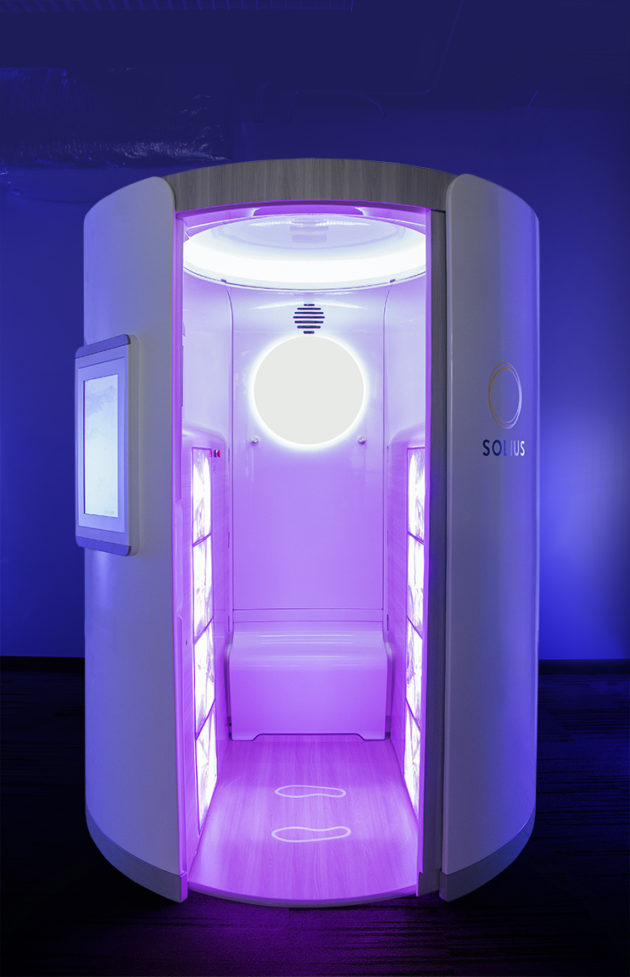
Vitamin D deficiency is one of most common health problems in the United States. Studies have found that as many as three-fourths of teens and adults in the U.S. may not be getting enough of the vitamin.
Seattle-based startup Solius is working to combat that problem with a light therapy kiosk that gives users convenient, self-service access to short bursts of light that stimulate vitamin D production. The 13-person company recently launched its first kiosks as part of a clinical trial in the Seattle area and is also preparing to launch the kiosks in Canada.
Solius CEO Rick Hennessey told GeekWire that the Solius kiosks are a better solution to vitamin D deficiency than taking supplements or spending more time in the sun, the traditional ways to combat deficiency.
“Like fresh air, clean water and proper nutrition, humans need sunlight that can’t be replaced with a pill,” Hennessey said in an email. “We developed the SOLIUS science because the sun creates skin cancer and supplements are not solving the problem.”
Hennessey said that one 2-to-4 minute light therapy session in a self-serve Solius kiosk will give a user the same amount of vitamin D as standing outside in the sun for 20 minutes, but does not expose people to nearly as much harmful radiation as that amount of time in the sun. The technology was developed by the company’s research arm, called Benesol Wellness.

The company enrolled 150 people in its initial clinical trial in the Seattle area, a step that is required before the device can be submitted for approval to the FDA. One kiosk in the trial was placed on Bainbridge Island, a 30-minute ferry ride from downtown Seattle, and another was placed at Joint Base Lewis-McCord, where Solius is working with the military on a clinical trial about war fighter readiness.
Hennessey said that the company didn’t seek out those with a vitamin D deficiency to take part in the trial. Rather, the company wanted to see who would self-refer to use the Solius device.
The user experience is entirely self-serve, though Hennessey said the company places the kiosks in areas like care centers where medical staff is nearby.
Because the Solius is regulated as a non-invasive medical device, the process for FDA approval is more relaxed than for a pharmaceutical drug. Solius is not conducting a randomized clinical trial to test the device’s effectiveness, for example, something most drugs must go through before they reach the market.
Hennessey said Solius, which has raised $10 million, is initially targeting Vitamin D deficiency but will also take aim at other health problems as it continues to develop the tech.
“We have designed this exciting light science to activate an important immune response that creates a long list of critical hormones and peptides to physiologically improve health, fight disease and improve happiness,” said Hennessey, a veteran entrepreneur who most recently sold Seattle mobile software startup Cequint for $112.5 million.
“We’re doing something that we believe will be better than any pharmaceutical drug, and we believe it’s the future of medicine,” he added.
Evidence behind the prevalence and health risks of vitamin D deficiency is still shaky, and the number of people with vitamin D deficiency is unclear. It’s difficult to accurately measure vitamin D intake and studies trying to pin down the problem have found that anywhere from one-third to three-fourths of U.S. adults are deficient.
And the jury’s still out on how vitamin D deficiency could impact someone’s risk of getting serious diseases. Some studies have found a correlation between low vitamin D and cancer, for example, while other studies haven’t found any correlation.
However, understanding the problem is becoming increasingly vital as vitamin D deficiency becomes more common. The number of people deficient in the vitamin has increased dramatically in the U.S. in the past decades, particularly among minority groups and those with other pressing health problems.



